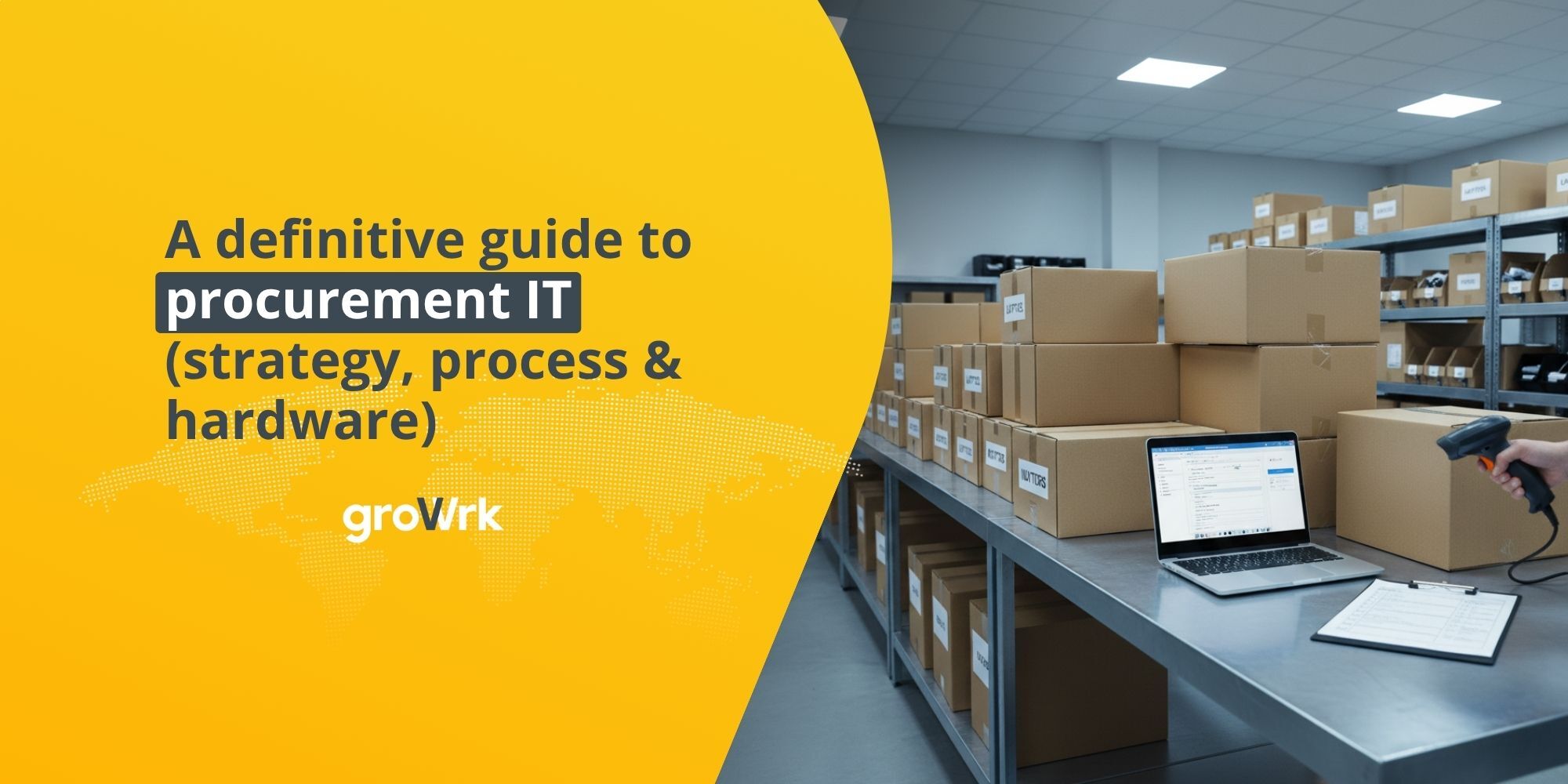ServiceNow Reviews: What you need to know
 GroWrk Team
GroWrk Team
ServiceNow has become the backbone of digital operations for 85% of Fortune 500 companies in the fast-paced world of service management. But what’s the real story behind this cloud-based powerhouse? Is it the all-in-one solution businesses swear by, or does it come with its own set of challenges?
In this guide, we’ll break down ServiceNow through the lens of real user experiences, highlighting the platform’s game-changing strengths and the hurdles that may trip you up along the way.
Key points
-
ServiceNow is a cloud-based SaaS platform used by 85% of Fortune 500 companies to automate business efficiency through IT and service management.
-
User reviews say ServiceNow is great for managing workflows and integrating multiple functions but also point out high costs and a steep learning curve.
-
Key benefits of ServiceNow include productivity through an automation engine, comprehensive integrations with external apps, and robust security and compliance features.
-
Governance risk and compliance (GRC) is a key benefit of ServiceNow, essential for process streamlining, compliance with regulations and risk prevention with rapid development cycles.
What is ServiceNow?
ServiceNow was founded in 2004 and has since grown into a service management powerhouse. Headquartered in Santa Clara, California, its initial focus was on improving IT services within organizations through IT service management.

Over time, ServiceNow has evolved into a cloud-based SaaS platform that manages IT services and automates business processes across multiple functions, including customer service management, HR service delivery, and security operations. The world works with ServiceNow to increase efficiency, accessibility, and innovation across industries.
The platform’s versatility and wide range of game-changing IT asset management tools allow organizations to tackle complex automated workflows and service requests easily, making it a key part of the single AI platform in modern business.
Key features of ServiceNow

One of ServiceNow’s biggest strengths is its many features. The platform has tools to manage and automate multiple business processes, from IT service management to HR service delivery and security operations.
ServiceNow’s IT Service Management (ITSM) is designed to manage IT services with minimal disruption to business. The ITSM tools include processes like incident management and change management to get service back to normal as quickly as possible and with minimal disruption.
The effectiveness of these tools is reflected in the platform’s high user ratings on G2. These capabilities make ITSM a key part of ServiceNow to keep IT running smoothly and address any issues that arise. Workflow automation and service requests further increase operational efficiency, making ITSM a must-have for business.
Customer service management (CSM)
ServiceNow’s Customer Service Management (CSM) uses AI to enhance customer interactions to resolve issues quickly and provide self-service options to customers. The integration of AI and self-service in CSM improves customer experience and makes service delivery more efficient.
By delivering service and improving customer interactions, CSM plays a big role in the overall customer experience. These features make ServiceNow a tool for managing customer relationships and high satisfaction.
IT asset management
ServiceNow’s IT Asset Management (ITAM) allows organizations to manage all hardware, software, and cloud assets in one place. ITAM automates the entire lifecycle of IT assets, from software to hardware to the cloud.
This approach gives organizations better visibility of IT assets to make better decisions and resource allocation. ITAM also reduces IT costs by automating asset tracking and lifecycle costs. Integration with the Configuration Management Database (CMDB) ensures data management and asset tracking is easier.
IT operations management
ServiceNow’s IT Operations Management (ITOM) gives organizations visibility into on-premises and cloud environments to streamline operations across the entire IT landscape. The platform uses predictive AIOps to predict issues and automate their resolution to increase service reliability and minimize downtime.
Key features include Service Mapping, which visualizes relationships between IT components and business services to better manage incidents and resource allocation. This level of visibility and automation helps organizations to improve response times and optimize resource utilization making ITOM a critical part of the ServiceNow platform.
HR service delivery (HRSD)
ServiceNow’s HR Service Delivery is all about improving employee experience by providing guided service journeys and automating HR processes. The platform has self-service portals that allow employees to access services independently, reducing the workload on HR teams and overall efficiency. HRSD improves overall employee experience by automating HR tasks such as onboarding and employee inquiries, simplifying HR teams’ management of their responsibilities. This focus on service delivery and automation makes HRSD a must-have in any organization’s HR toolset.
Security operations (SecOps)
ServiceNow’s Security Operations (SecOps) is about automating security incident response so organizations can react fast to threats.
SecOps integrates with existing security tools to provide a single view to manage and streamline security operations to manage risks effectively. This integrated approach to security operations is key for organizations to maintain compliance and protect their assets. Automated security workflows and real-time insights from SecOps help organizations stay ahead of threats and be secure.
IT Regulation Compliance
ServiceNow’s IT compliance features ensure organizations adhere to governance, risk, and scaling compliance standards through integrated workflows.
The platform meets various compliance standards, including ISO/IEC and GDPR, so operations meet international standards. Integrating compliance into the service delivery process, ServiceNow helps organizations to mitigate risks and comply to industry regulations.
These features make ServiceNow a great choice for businesses to maintain high standards of governance and compliance.
Key benefits of ServiceNow
.png?width=600&height=300&name=MDM%20features%20(9).png)
ServiceNow offers many benefits that can increase productivity and drive business outcomes. The cloud-based platform allows organizations to automate workflows, streamline operations, and deliver service. The integration of AI and machine learning further increases productivity, making it a must-have for modern businesses. Let’s dive in.
Enhanced productivity
One of the key benefits of ServiceNow is productivity. The platform’s IT Service Management (ITSM) tools automates tasks of workflows so organizations can manage service requests efficiently and reduce manual tasks. This automation not only speeds up processes but also frees up resources that can be directed to more strategic initiatives.
Streamlined IT services and better incident management and resource allocation help organizations achieve their business outcomes faster with ServiceNow. The use of AI-powered tools further increases productivity by automating routine tasks so employees can focus on higher-value activities.
Comprehensive integrations
ServiceNow can integrate with many external applications thanks to its Integration Hub. This feature allows for cross-platform workflows so business processes can be more efficient. As a System of Action, ServiceNow integrates with existing data and systems without replacing them; it’s versatile for organizations of all sizes.
Users have said these integrations have improved workflow efficiency, so ServiceNow is a choice for businesses to streamline their operations within the ServiceNow ecosystem to develop. The ability to connect to 3rd party systems seamlessly is a key reason for its adoption.
Security and compliance
Security and compliance are a top priority for any organization, and ServiceNow meets many strict standards to ensure data protection. The platform meets various compliance standards, including ISO/IEC 27017:2015, ISO/IEC 27001:2022, SSAE 18 SOC 1, and SOC 2, and is GDPR compliant. These certifications prove ServiceNow’s commitment to high security and privacy.
ServiceNow’s Security Operations (SecOps) integrate security into service operations so organizations can respond fast to security threats and be compliant through integrated security workflows. This comprehensive approach to security and compliance makes ServiceNow a great choice for organizations across industries.
Industry-specific applications of ServiceNow

ServiceNow is versatile and can be applied to many industries, each benefiting from its service management capabilities. From finance and supply chain to healthcare and manufacturing, the platform automates and optimizes business processes to increase efficiency and business outcomes.
Let’s see how different industries use ServiceNow.
-
Finance and Supply Chain: In finance and supply chain, ServiceNow integrates processes to streamline operations and engagement with stakeholders. The platform automates IT procurement workflows and enhances collaboration throughout the supply chain, so compliance and processing time are reduced.
ServiceNow also improves tracking and management of financial transactions so tools simplify compliance and visibility into supply chain management. These features help organizations to achieve their strategic portfolio management goals and business success.
-
Healthcare: In healthcare, ServiceNow automates patient management and clinical workflows. The platform helps organizations to be more efficient by automating administrative tasks and better patient management so high standards of care are maintained.
ServiceNow’s solutions support better communication between stakeholders and optimize workflows and patient management through integrated systems. These features make ServiceNow a must-have for healthcare providers to streamline their operations and patient outcomes.
-
Manufacturing: Manufacturing companies use ServiceNow to manage assets and automate production so operational costs are reduced. The platform supports asset management and process automation, so downtime and operational efficiency are improved.
ServiceNow helps manufacturing companies to allocate resources better and drive business success through asset management and optimized production processes. These features make ServiceNow a must-have for the manufacturing industry.
User ratings and reviews
User ratings and reviews are important to understand the real-world impact of a platform like ServiceNow. They give insights into employee and customer experience and what the platform is good at or bad at.
Platforms like G2 and Gartner Peer Insights provide detailed feedback from users who know the platform inside out, so it’s a must-visit for anyone considering ServiceNow.
-
G2 user ratings: On G2, the Now platform has a rating of 4.4 out of 5 stars based on over 2,100 real-user reviews. This high rating reflects the good experience many users have had with the platform to manage services.
The feedback says the platform streamlines workflows and improves operational efficiency so it’s a trusted choice for many organizations. Request info or schedule the latest ServiceNow demo to stay informed.
-
Gartner peer insights: Gartner Peer Insights provides another layer of user feedback and reviews from IT professionals and business leaders who have worked with a partner or would like to know more about the platform.
Many have praised ServiceNow for its integration capabilities and IT workflow management. Some have mentioned the high cost of entry and the steep learning curve.
What to know before using ServiceNow?
While ServiceNow has many benefits, it’s not without its challenges. Prospective users should be aware of the downsides such as the high cost of entry and the steep learning curve.
Knowing these challenges will help organizations prepare better for the implementation and set realistic expectations.
-
High cost of entry: One of the major challenges of ServiceNow is the high cost of entry. For smaller businesses, the initial investment can be a big barrier, often above $100,000. This can be a showstopper for smaller companies with tighter budgets.
While many users find the long term efficiency gains and operational improvements justify the cost, organizations should carefully review their financial capability and determine if the platform is worth the initial investment.
-
Steep learning curve: ServiceNow is known for its complex features, which contribute to the steep learning curve. Smaller businesses, in particular, may find the platform overwhelming and need dedicated support teams to navigate the features effectively.
The complexity can be frustrating during the initial implementation phase; training and support are essential. Organizations should invest time and resources to ensure their employees can master the platform and fully utilize its features. While the learning curve is steep, the long-term payoff of being proficient with ServiceNow is substantial.
-
User feedback and reviews: User feedback and reviews give a balanced view of ServiceNow’s strengths and weaknesses. Many users praise its features, scalability, and integration. Others mention challenges like high cost and steep learning curve which can make the platform difficult to adopt for some organizations.
These reviews are helpful for prospective users to set realistic expectations and prepare for the implementation. By reading feedback, businesses can make more informed decisions if ServiceNow is the right solution for them.
Why GroWrk is a smart integration for ServiceNow
![]()
If you're seeking a streamlined, flexible, and budget-friendly integration for ServiceNow, GroWrk offers a platform that elevates your IT asset management, from procurement to secure disposal.
Here’s why GroWrk stands out:
- Global IT coverage: Operates in 150+ countries, supporting distributed teams with fast, reliable equipment deployment, retrieval, storage, and disposal.
- End-to-end lifecycle management: Automates procurement, configuration, shipping, and returns—all from a single platform.
- AI-powered support: Offers real-time troubleshooting via AI chatbot and smart monitoring to reduce downtime and keep teams productive.
- Advanced security built-in: Includes mobile device management (MDM), identity management, and remote control capabilities to maintain compliance and safeguard assets.
- Transparent, flexible pricing: No hidden fees or complex contracts—just pay per managed device or logistical movement. A freemium option is also available.
- Sustainability-first approach: Supports eco-friendly recycling and resale, helping companies reduce waste and meet ESG goals.
- Fast, responsive support: Every customer gets a dedicated Customer Success Manager for tailored, hands-on help.
Ready to simplify your IT operations? Book a demo with GroWrk and see how our platform delivers global IT asset management—without the complexity or hidden fees.
FAQs
What kind of platform is ServiceNow?
ServiceNow is a cloud based SaaS platform that manages and automates business processes across the organization. It simplifies work in the workplace.
How many Fortune 500 companies use ServiceNow?
About 85% of Fortune 500 companies use ServiceNow, so it’s a big player in the corporate world.
What’s the major drawback of ServiceNow?
The major drawback of ServiceNow is the high cost and steep learning curve which requires dedicated support teams.
What’s the estimated cost for a mid-size company to get started with ServiceNow?
The estimated cost for a mid-size company to get started with ServiceNow is around $50,000. This will give you access to the basic services that will help you to improve operational efficiency.
What compliance standards does ServiceNow meet?
ServiceNow meets multiple security and privacy standards, including ISO/IEC 27017:2015, ISO/IEC 27001:2022, SSAE 18 SOC 1, and SOC 2, and complies with GDPR. So it’s secure and data protection for its users.






